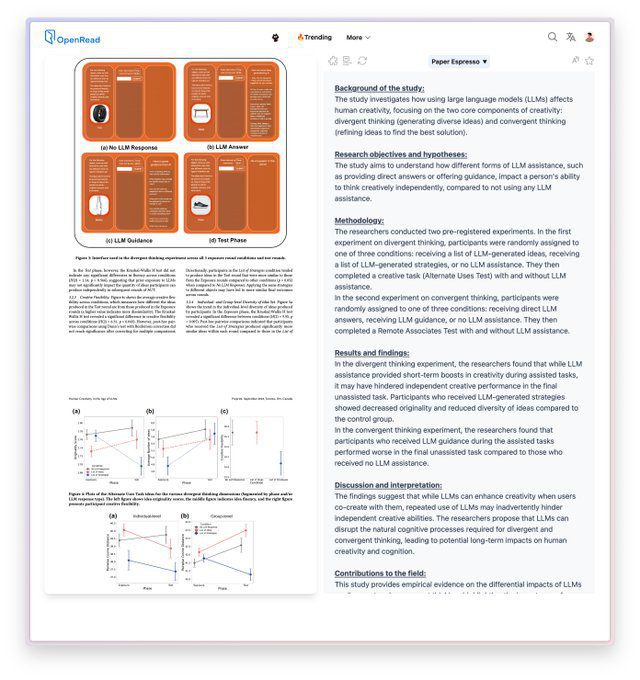In the rapidly evolving landscape of technology and artificial intelligence, the impact of Large Language Models (LLMs) on human creativity has become a topic of significant interest. A recent study conducted by Harsh Kumar, J. Vincentius, E. Jordan, and Ashton Anderson, titled , explores the effects of LLM assistance on divergent and convergent thinking.
Randomized Experiments on Divergent and Convergent Thinking
The study involved randomized experiments to assess the influence of LLMs on both divergent and convergent thinking. Divergent thinking refers to the ability to generate creative ideas by exploring many possible solutions, while convergent thinking focuses on finding a single, correct solution to a problem. The researchers found that LLM assistance can provide short-term boosts in creativity during assisted tasks. However, it may inadvertently hinder independent creative performance when users work without assistance, raising concerns about the long-term impact on human creativity and cognition.
Experiment Findings
According to the TechCrunch article, the study involved hundreds of participants who were asked to write short stories of eight sentences. The participants were divided into three groups: one group worked without any AI assistance, the second group could consult GPT-4 for a single story idea, and the third group could get up to five story starters. The stories were evaluated on novelty, usefulness, and emotional enjoyment.
The researchers found that people with lower creativity metrics scored lowest on evaluations of their stories. However, when given the opportunity to use a generated story idea, they scored higher on every metric. Given the choice of five AI-generated ideas, they scored even higher. This suggests that for individuals struggling with the creative side of writing, AI assistance can genuinely improve the quality of their work.
Impact on Highly Creative Individuals
Interestingly, the study revealed that participants who scored highly on the creativity metric saw little to no benefit from AI assistance. In some cases, their writing quality even declined slightly. This indicates that highly creative individuals produce their best work when they have no AI help at all. The researchers suggest that AI had a zero to negative effect on writers with innate creativity.
Collective Novelty and Homogenization
Beyond individual creativity, the study also examined the collective impact of AI-assisted writing. Using OpenAI’s embeddings API, the researchers found that access to generative AI caused the resulting stories to be more similar and less varied as a group. This similarity might be an artifact of less practiced writers finishing a suggested story versus more creative writers coming up with one from scratch.
The findings raise concerns about the potential homogenization of creative works. If the publishing industry were to embrace more generative AI-inspired stories, the produced stories might become less unique in aggregate and more similar to each other. This could lead to a ‘self-perpetuating cycle of blandness,’ where individual writers use AI more frequently, reducing the collective novelty of stories.
Ethical Considerations and Future Research
The study highlights the ethical considerations surrounding the use of LLMs in creative tasks. The potential for decreased diversity and originality in creative works is a significant concern. The researchers emphasize the importance of evaluating AI rigorously rather than implementing it widely under the assumption of positive outcomes.
Oliver Hauser, one of the researchers, stated, “Our study represents an early view on a very big question on how large language models and generative AI more generally will affect human activities, including creativity.” He added, “While there is huge potential (and, no doubt, huge hype) for this technology to have big impacts in media and creativity more generally, it will be important that AI is actually being evaluated rigorously — rather than just implemented widely, under the assumption that it will have positive outcomes.”
Future research will need to explore the implementation of AI as real-world applications may differ significantly from controlled settings. Ensuring continued diversity of creative ideas, whether in writing or music, will be crucial as AI technology continues to evolve.
Related Articles
- 5 Ways to Implement AI into Your Business Now
- Top 5 AI Tools for Students
- Tricks Every Architect Should Know to Excel in Their Career
- Top 7 Legal AI Tools for Law Practitioners
- Launching Deep Lex: Where Law Meets AI
Looking for Travel Inspiration?
Explore Textify’s AI membership
Need a Chart? Explore the world’s largest Charts database
